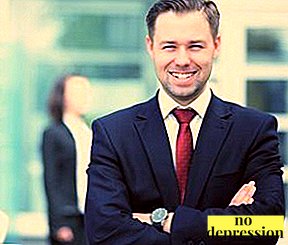The term "emotional burnout" in 1974 was introduced by Herbert Freudenberg. The psychologist has united under this concept an indifferent attitude to work, a negative attitude towards partners and colleagues, "professional" Samoyed, the feeling that the results of the work done are not of sufficient quality. In some countries, emotional exhaustion syndrome is considered a disease. He has a phase of development and treatment.
What is emotional burnout
Emotional burnout is a protective mechanism, which is expressed in partial or complete suppression of emotions in response to traumatic effects. A person is entrusted with a lot of affairs, worries, duties. In the course of the research, 88% of respondents admitted that it is extremely difficult for them to find a balance between work and personal life. Imbalance causes stress, anxiety, apathy. Emotional fatigue develops into physical.
Most often there is an emotional burnout of teachers, doctors, employees working in non-profit organizations, that is, people of professions that involve a high return.
Causes of internal exhaustion can be:
- lack of communication between the forces invested and the result of labor;
- limited amount of time in order to achieve your goals;
- inability to control emotions;
- heavy loads and serious responsibility;
- low level of communication skills and stress tolerance.
Phases and symptoms of emotional exhaustion
V.V. Boyko, having analyzed the burnout syndrome, suggested such phases of its development.
Voltage
This is the first phase that starts the mechanism of emotional exhaustion. It is expressed in such symptoms:
- Experiencing traumatic circumstances. A person realizes that his work does not bring the results that he expects. Increasing tension, despair. Failure to find a solution leads to a burnout effect.
- Dissatisfaction. Failures make a person feel dissatisfied with himself, in the mornings you don’t want to get up because of the understanding that you have to spend all day on disliked work. The mechanism of "transfer" is triggered, when the energy that must be directed to the outside world is spent on self-torture.
- Cornered. There is total helplessness. The person gives up and stops even trying to change something. He has a feeling of lack of resources, full of emotional, intellectual exhaustion.
- Depression. There is a disappointment in himself, as in a professional. Sometimes not their own skills, but the place of work cause concern. For example, a person understands that his abilities are high, but he cannot realize them in a given position, and he is not given a raise.
Resistance
Not always this phase can be distinguished as a separate one. Resistance to stress can occur at the very beginning of the formation of exhaustion. The body is trying to cope with stress, to achieve comfort, this process is not always successful, therefore the following phenomena are possible:
- Selective reaction. A person stops to see the difference between "saving" emotions and inadequate selective reaction. In the first case, everything is good, in business communication, too vigorous emotional response is not welcomed, a friendly smile, a handshake, a light tap on the shoulder, and unhurried speech are enough. The reaction to stimuli must also be calm, not containing coarseness. In the second case, the principle "I want to react - I want not to react." An example is the inhospitable saleswoman. The buyer smiles, greets, behaves politely, and in response receives a stone facial expression, excessive dryness. This seems to be not rude, but such an excessive and untimely saving of emotions is perceived as disrespect.
- Emotional and moral disorientation. Most often manifested in a bunch of "director-slave". The emotionally exhausted chief has thoughts of “why should I feel sorry for someone, this is work, because there are no holidays”, “if every time you write out prizes, subordinates will sit around your neck”. The situation is especially aggravated if this symptom manifests itself in social workers, doctors, and teachers, then the confusion of morality can prevent them from remaining professionals. They begin to divide people into good and bad, they are the first to give help, the second - they are depriving it.
- Transferring savings of emotions to personal spheresy Professional issues begin to affect privacy. Tired of talking and solving difficult situations at work, a person refuses contact with family, friends, closes, grumbles at loved ones.
- Reduction of professional duties. The person is trying to make his work easier, to relieve himself of some of the responsibilities. Leaves without attention their subordinates.
Lack of energy and weakening of the nervous system
Burnout turns into a habitual way of life of a person. It is difficult to imagine that he was once different, it seems that it is already impossible to restore the energy level.
- Emotional deficit. A person has a feeling that he is not capable of helping his wards. He can not sympathize, empathize, puts himself in the place of a subordinate or another person. Resentment, rudeness appear, communication becomes harsh, malevolent, a person easily becomes irritated, leaves himself. A person may feel that before all this was not, and the appearance of these qualities upsets and aggravates the situation.
- Emotional detachment. A person clearly shares work and personal life. In the professional sphere, he completely rejects emotions, while in the rest he fully uses them. The result of such behavior may be psychological trauma to the wards, who are upset that the boss does not pay them enough attention, and in some cases is defiantly removed. Gradually, depersonalization begins to “correct” the system of personal values. Its earliest manifestations are voiced as fatigue from people. A professional tries to avoid contact. In more advanced cases, you can hear from him the phrases "I hate my colleagues", "foolish customers are tired, I would shoot them," etc. This state borders on psychopathy.
- Psychovegetative and psychosomatic disorders. Emotional exhaustion does not always change human values. It can affect it otherwise - cause somatic changes. For example, at the thought of a ward, a person rises in pressure or exacerbates a chronic illness, from understanding that one has to go to work, severe depression arises.
Burnout Syndrome: Treatment
If emotional burnout is observed, treatment should be comprehensive. Help 10 simple tips.
1. Meditation
The main essence of this technique is to stay in silence, turn off the brain. Ideally, you need to find a really quiet place, but since there is always something in the way (neighbors, sounds from the street, etc.), you can turn on soothing music. It is desirable that it does not cause any vivid emotions, a song that is associated with the first love or painful parting will not work. Meditation should be mastered in order to learn to let go of the negative, to clear the mind.
2. Movement
Internal exhaustion sometimes physically knocks down. But instead, it’s better to move, no matter how. You can jump, wave your hands, dance, even if there is no talent for it. A ten-minute morning exercise, a walk will be useful.
3. Refusal of caffeine
If nervous tension is present, then it is better not to supplement it with "caffeine cheerfulness." A cup of strong Arabica should be replaced with herbal tea. If you can't wake up in the morning without coffee, then you should turn it into a ritual, enjoying the aroma and taste. Do not drink in a hurry.
4. Conscious nutrition
You should refuse to eat on the run, instead you need to allocate time for food and only on it, putting the smartphone, laptop. You can pay attention to the appearance of the food, then the process will be more conscious. The diet should be replenished with fresh fruits and vegetables.
5. Minimum 8 hours of sleep
It is very important to get enough sleep. Scientists have found that the body needs 8 hours of proper sleep for normal functioning. It will be useful to establish a specific schedule, and not to go to bed when it pleases. The lucky ones who can afford daytime sleep can also give him 30-60 minutes. This will help recuperate.
6. Personal care
Emotional exhaustion leads to the fact that a person loses the desire to take care of themselves. Relaxing bath, going to a beauty salon or barbershop, skin care will help restore harmony.
7. Small joys
You need to do what you want. If fatigue fells off, and at home a mountain of dishes that you don’t want to wash, let it stand for a day, it is better to recuperate today to move the mountains tomorrow. No need to try to do everything, workaholism with emotional exhaustion is contraindicated, but the evening with your favorite movie and popcorn or shopping with friends can help recover.
8. The balance of internal and external
The inner voice sounds inside each of us. For example, if he claims that he needs to go for a walk, and his body has lazily collapsed on the sofa, then it is worth making an effort over himself and go out. It happens and vice versa, the voice confidently says that you need to work on the weekends, but on Saturday the eyes are sorely reluctant to open, perhaps the body gives a signal that it is tired, he needs a break.
9. New habits
Let there be something new in every day. Instead of going to work in the morning, walk on foot, at least a few stops. Go to the new store, which has not yet been, arrange a week of kitchens of the world, every day trying a new dish. This will revive the situation.
10. Hobbies
Well, if you already have a hobby, if you don’t have one, then you might think what you would like to do. It can be, as what turns out well, and what would only like to learn.
Emotionally burnout is quite real. Many people suffer from it. If you do not take him seriously, you can get depressed. It is important to notice it in time and correct this psychological defect.



